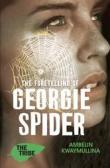 7687159380701344090.jpg
7687159380701344090.jpg
 7687159380701344090.jpg
7687159380701344090.jpg
'A storm was stretching out across futures to swallow everything in nothing, and it was growing larger, which meant it was getting nearer... Georgie Spider has foretold the end of the world, and the only one who can stop it is Ashala Wolf. But Georgie has also foreseen Ashala's death. As the world shifts around the Tribe, Ashala fights to protect those she loves from old enemies and new threats. And Georgie fights to save Ashala. Georgie Spider can see the future. But can she change it?'
Source: Publishing blurb.
'Australia has produced many post-disaster novels since the 1980s, our landscape and sense of global isolation inspiring long lists of environmental and political crises. While this literature provokes considerable work from ecocritical and postcolonial perspectives, the representation or use of disability in post-disaster narratives is less studied. This essay undertakes crip readings of a range of Australian young adult novels published since the 1980s, including Isobelle Carmody’s long running Obernewtyn chronicles (1986-2015) and Ambelin Kwaymullina’s Tribe sequence, particularly The Interrogation of Ashala Wolf (2012) and The Foretelling of Georgie Spider (2015).'(Publication abstract)
Indigenous people lived through the end of the world, but we did not end, We survived by holding on to our cultures, our kin, and our sense of what was right in a world gone terribly wrong (Kwaymullina, 'Edges' 29)
'Young Adult Australian post-apocalyptic speculative fiction carries with it a number of expectations and tropes : that characters will exist in a dystopian, ruined landscape, that a lone teenager will rise up and rebel against institutionalised structures of repressive power; and that these youths will carry hope for the future in a destroyed world.' (Introduction)
Indigenous people lived through the end of the world, but we did not end, We survived by holding on to our cultures, our kin, and our sense of what was right in a world gone terribly wrong (Kwaymullina, 'Edges' 29)
'Young Adult Australian post-apocalyptic speculative fiction carries with it a number of expectations and tropes : that characters will exist in a dystopian, ruined landscape, that a lone teenager will rise up and rebel against institutionalised structures of repressive power; and that these youths will carry hope for the future in a destroyed world.' (Introduction)
'Australia has produced many post-disaster novels since the 1980s, our landscape and sense of global isolation inspiring long lists of environmental and political crises. While this literature provokes considerable work from ecocritical and postcolonial perspectives, the representation or use of disability in post-disaster narratives is less studied. This essay undertakes crip readings of a range of Australian young adult novels published since the 1980s, including Isobelle Carmody’s long running Obernewtyn chronicles (1986-2015) and Ambelin Kwaymullina’s Tribe sequence, particularly The Interrogation of Ashala Wolf (2012) and The Foretelling of Georgie Spider (2015).'(Publication abstract)